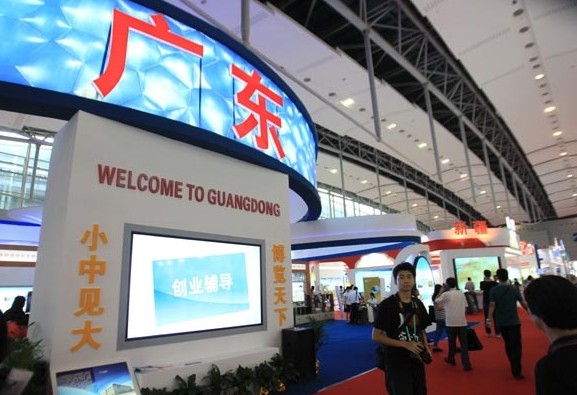| « WB projects global economy to grow 3.2 pct in 2014 | Expats in top demand for Chinese state-owned enterprises » |
Guangdong outlines big FTZ plans

A booth showcasing Guangdong-based businesses at an expo in Guangzhou, the province's capital. Guangdong is currently seeking central government approval of a Guangdong-Hong Kong-Macao free trade zone. Provided to China Daily
Southern province aims to capitalize on links with neighboring regions
The Guangdong provincial government has vowed to realize liberalization of trade in services in the South China province and its neighboring Hong Kong and Macao special administrative regions by this year through CEPA (the Closer Economic Partnership Arrangement).
"It is a task assigned to Guangdong by the State Council," Vice-Governor Xu Shaohua told a Monday news conference. "We are striving for the central government's approval of specific preferential projects and policies.
"At the same time, we will open up more fields for investors from Hong Kong and Macao, including those in the service sector, using a 'negative list'."
Xu also said Guangdong is currently seeking central government approval of a Guangdong-Hong Kong-Macao free trade zone.
"We are talking with ministries about the construction plan and preferential policies," Xu said.
At a joint meeting between Guangdong and Hong Kong in September, Guangdong Governor Zhu Xiaodan said that the new free trade zone will focus on liberalizing trade and building a platform for the cooperation in the high-end service industry, capitalizing on Hong Kong's reputation as a premier international finance center.
A focus on liberalizing trade in services will set this free trade zone apart from the China (Shanghai) Pilot Free Trade Zone, which focuses on financial openness, according to Lin Jiang, dean of the public finance and taxation department of Lingnan College at the Guangzhou-based Sun Yat-sen University.
"The volume of trade in services has surpassed that of trade in goods in international trade," said Lin, who also is vice-director of the university's research center of Pearl River Delta, Hong Kong and Macao.
"The Guangdong-Hong Kong-Macao free trade zone is the pilot zone in China to make breakthroughs in fields such as offering tax refunds for service exports, which are intangible goods," Lin said.
"Liberalizing trade in services also answers the province's need for upgrading and transforming its processing trade. That's why the province doesn't stress liberalizing trade in goods," said Lin, who gave as examples of modern service industries high-end design and management consultancies.
Zhu also noted at the September meeting that the new free trade zone will help adapt the mainland's financial management mechanism to international practices in Hong Kong.
Lin said it will benefit the province to make business laws and regulations according to international practices in Hong Kong, since that will be one of the free trade zone's major incentives for international investors, compared with the Shanghai free trade zone.
Xu listed several items on the Guangdong government's action plan for liberalizing trade in services in the zone. They include: relaxing or canceling restrictions on Hong Kong and Macao investors' qualifications, shareholding ratios and/or scope of business; promoting mutual attestation of professional qualifications; and exploring possible business modes for individual professional services.
"The Hengqin New Area in Zhuhai, the Nansha New Area in Guangzhou and the Qianhai experimental zone in Shenzhen are the three areas opened up for Hong Kong service industry," Xu said. "In addition, Zhongshan, Foshan and Dongguan cities are proposing platforms to attract investors from Hong Kong and Macao."
The latest announced preliminary plan of the Guangdong-Hong Kong-Macao free trade zone includes the three new areas and experimental zones plus Guangzhou Baiyun International Airport, taking up an area of more than 1,300 square kilometers, which is 47 times of that of the Shanghai free trade zone.
Lin warned that it would be a challenge for the Guangdong government to figure out a way to coordinate so many areas.
Part of the reason for Monday's news conference was to interpret the provincial Party committee's suggestions for Guangdong's implementation of the central government's comprehensive reforms.
The suggestions were approved by the Third Plenum of the 11th General Assembly of the Guangdong Provincial Party Committee, held last weekend in Guangzhou.
"To further open up the province, Guangdong will also strengthen its cooperation with the US and European developed countries by establishing overseas offices of economic trade in these countries," Xu said, adding that an office in Germany already has been set up.
"This is to get in touch directly with big multinational corporations to attract investments and technologies that will assist in upgrading and transforming Guangdong's economy," he said.
Guangdong, the largest Chinese trader for ASEAN countries, also will further promote its foreign trade with these countries and spearhead the central government's strategy of building the Maritime Silk Road of the 21st century.